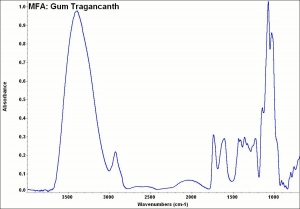Gum tragacanth
Description
An exudate from several species of shrubs of the genus Astragalus (especially Astragalus gummifer) found in the dry regions of Iran, Iraq, Syria, and Turkey. Gum tragacanth consists of a complex mixture of acidic polysaccharides containing galacturonic acid, Galactose, fucose, Xylose, and Arabinose. Tragacanth gum is available in the form of dull white, translucent plates (fiori) or as a yellowish powder (biondo). A soluble fraction, tragacanthin, dissolves when added to water, whereas an insoluble fraction, bassorin (60-70% by wt.) swells to a gel-like state. A solution of gum tragacanth is prepared by wetting the powder with alcohol, then adding water and shaking. Aqueous solutions are slightly acidic with a pH of 5-6. Gum tragacanth is used for textile sizing and printing, pastel crayon production, leather curing, and furniture polishes.
Synonyms and Related Terms
goma de tragacanto (Esp.); gomma adragante (It); gomma tragacante (It); olibanum; tragacanth; gum dragon; gomme adragante; Smyrna tragacanth; Anatolian tragacanth; Persian tragacanth; gum elect; fiori; biondo
Risks
- Combustible.
- Inhalation and skin contact may cause allergies.
- Fisher Scientific: MSDS
Physical and Chemical Properties
Water swellable after wetting with ethanol. Soluble in alkali and hydrogen peroxide. Insoluble in ethanol.
| CAS | 9000-65-1 |
|---|---|
| Density | 1.25-1.384 g/ml |
Resources and Citations
- R.Newman, M.Serpico, "Adhesives and Binders" in Ancient Egyptian Materials and Technology, P.Nicholson, I.Shaw (eds.), Cambridge University Press, 2000, p. 475-494.
- R. J. Gettens, G.L. Stout, Painting Materials, A Short Encyclopaedia, Dover Publications, New York, 1966
- Reed Kay, The Painter's Guide To Studio Methods and Materials, Prentice-Hall, Inc., Englewood Cliffs, NJ, 1983
- Ralph Mayer, A Dictionary of Art Terms and Techniques, Harper and Row Publishers, New York, 1969 (also 1945 printing)
- Richard S. Lewis, Hawley's Condensed Chemical Dictionary, Van Nostrand Reinhold, New York, 10th ed., 1993
- The Merck Index, Martha Windholz (ed.), Merck Research Labs, Rahway NJ, 10th edition, 1983 Comment: entry 4609
- Encyclopedia Britannica, http://www.britannica.com Comment: "gum." Accessed 7 Apr. 2005 .
- G.S.Brady, Materials Handbook, McGraw-Hill Book Co., New York, 1971 Comment: p. 822
- Matt Roberts, Don Etherington, Bookbinding and the Conservation of Books: a Dictionary of Descriptive Terminology, U.S. Government Printing Office, Washington DC, 1982
- Wikipedia: http://en.wikipedia.org/wiki/Tragacanth (Accessed Jan. 25, 2006)
- S.R.Trotman, E.R. Trotman, Textile Analysis, J.B. Lippincott Company, Philadelphia, 1932
- Michael McCann, Artist Beware, Watson-Guptill Publications, New York City, 1979
- I.W. Cottrell, J.K. Baird, gums chapter
- Random House, Webster's Encyclopedic Unabridged Dictionary of the English Language, Grammercy Book, New York, 1997
- John S. Mills, Raymond White, The Organic Chemistry of Museum Objects, Butterworth Heineman, London, 2nd ed., 1994
- Website address 1 Comment: "Violin Varnish Glossary" at www.violins.on.ca/luthier.vargloss.html
